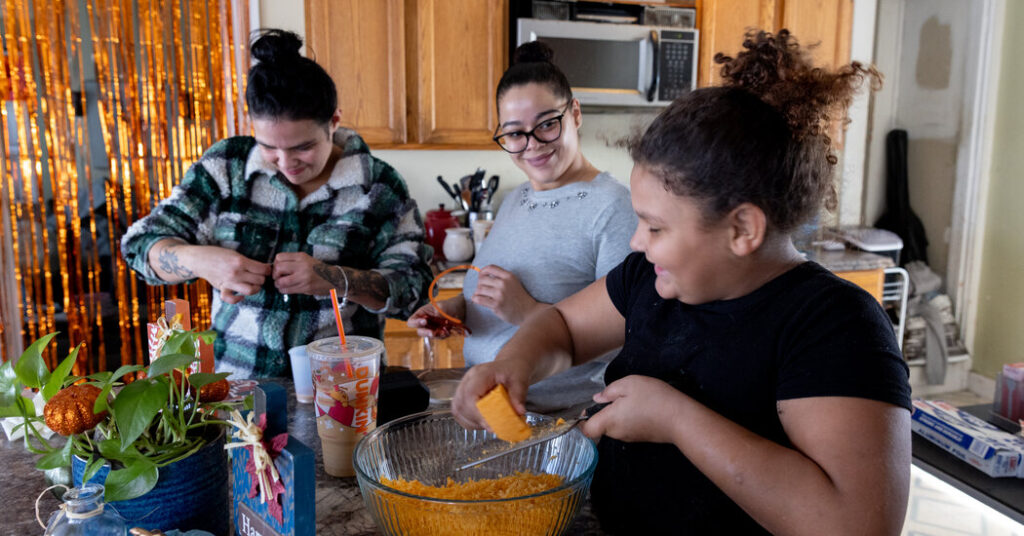In her kitchen in Haverhill, Mass., on Thursday, Leanna Nieves approached the construction of her homemade macaroni and cheese with the passion of an artist, and an architect’s precision. She cooked three boxes of pasta and grated, chopped and mixed four kinds of cheese, mounding it in a massive foil turkey pan.
Until a few days ago, Ms. Nieves, 34, had not known if there would be a turkey in her oven this year, with food prices soaring and her federal grocery benefits thrown into uncertainty in recent weeks. But she knew there had to be homemade macaroni for her three children, ages 9, 13 and 15.
“The kids told me, we can go without a turkey, but please make mac and cheese, if you don’t make anything else,” she said.
A few days earlier, Ms. Nieves shopped for groceries for Thanksgiving at a market in Haverhill. Together, the family had decorated for the holiday, hanging balloons shaped like acorns and autumn leaves and arranging tiny velvet pumpkins on the table. The youngest, Olive, had dressed up, with a red bow in her hair. The two family cats, Luna and Cleo, had joined the party.
Ms. Nieves’s best friend had made the drive from Worcester, an hour west, to join them, bringing her own two children and a container of fragrant homemade Spanish sofrito, a flavorful sauce the friends would use to season several dishes.
It felt like Thanksgiving in the ways that mattered most to Ms. Nieves: Her family was together, and, for a few hours, they could set aside the nagging daily worries about rent and groceries and car repairs. As the day wore on, fear and anxiety gave way to an unexpected kind of grace.
“It’s like a pause in time,” she said. “A day when you can enjoy each other.”
Like 42 million people across the country, Ms. Nieves and her children rely on monthly benefits from the Supplemental Nutrition Assistance Program, or SNAP, to buy groceries. She did not lose her benefits during the prolonged government shutdown that caused interruptions for many. But Ms. Nieves said that she, too, was fearful and anxious, as she worried that help would stop coming. And she believed that the disruption had altered her outlook for the long term.
“The way politics are now, you just don’t know,” she said. “You need to train yourself, in case something happens again, to exhaust your resources, and not be so reliant on the benefit.”
That was not so easy. But she had her strategies. When her car was working, she visited local food pantries twice a month to stock up on produce, beans and rice, a way to slow her spending of her monthly SNAP benefit.
Ms. Nieves grew up in and around Haverhill, a city of 68,000 northwest of Boston that sits on the border with New Hampshire. About 21 percent of residents, or 14,400 people, receive SNAP benefits.
Ms. Nieves was raised by a single father who worked multiple jobs and did not believe in accepting government help, she said. His aversion stuck with her, and it contributed to the shame she felt when she applied for SNAP benefits after the birth of her first child.
“I was embarrassed,” she said. “I didn’t want anyone to know.”
Since then, she has not received the benefits continuously. When she found a stable, full-time desk job at a school where she had previously volunteered, she expected to keep it for many years. But she was diagnosed with a heart condition, postpartum cardiomyopathy, after the birth of her third child. Doctors implanted a pacemaker device. Complications followed, and more surgeries. She had to take time off from work. Eventually, she lost her job.
Assistance from the SNAP program allowed her to feed her children, she said. She has worked off and on since, and she recently took a part-time job at a Salvation Army thrift store where she has shopped for clothes for much of her life.
The day before Thanksgiving, Ms. Nieves said, she learned that her SNAP benefit would be cut roughly in half next month, to $464, the likely result of a government reassessment that now takes her part-time employment into account. She worried that it might not be enough.
As her grocery bills have ticked higher, Ms. Nieves has cut back. She buys less meat and looks for dinners she can stretch into two meals. Seafood, which her children love, is off the table. There are fewer fresh vegetables and more frozen.
Shopping on Tuesday for supplies to make her Thanksgiving meal, at a Market Basket grocery store near her home, Ms. Nieves consulted a neat handwritten list, crossing out items as she placed them in her cart. Almost everything she bought was the store brand. Instead of buying bags of shredded cheese for the macaroni, she chose blocks of Colby Jack and Cheddar.
“I can shred it myself, and it’s cheaper,” she said.
Standing in the pasta aisle, she scanned the shelves for her preferred shape, cavatappi, frowning when she did not see the twisty spirals. Then she brightened as she spotted them on the highest shelf, stretching from her tiptoes to pull down four boxes.
“My friend’s son asked if I could make ‘pounds and pounds’ of mac and cheese so he can take some home,” she said. She planned to make extra to fulfill his request.
Years after overcoming the stigma of signing up for SNAP benefits, Ms. Nieves said she now tries to talk more openly about her experience to encourage others in need to ask for help.
“There are a lot of people in my position who feel like they’re alone,” she said.
As darkness began to fall on Thursday afternoon, it was time to unveil the macaroni. Ms. Nieves placed the platter on the kitchen island and peeled away the foil to reveal the steaming casserole, then scooped the cheesy pasta onto paper plates. The turkey, brined and seasoned, was a perfect golden brown, but her children remained laser-focused on the Thanksgiving dish they had wanted most.
In a strange way, Ms. Nieves said, the government shutdown, and the resulting threat to her food assistance benefits, had made her more thankful. In her mind — hard-wired for optimism, she explained — it had brought the good things in her life that could not be taken away into sharper focus.
“It’s a reminder to appreciate what you do have, things you can still work with,” she said. “Your family, your friends. They’re not going to be shut down. They will still be here.”
Jenna Russell is the lead reporter covering New England for The Times. She is based near Boston.
The post On Thanksgiving, an Unexpected Kind of Grace appeared first on New York Times.




